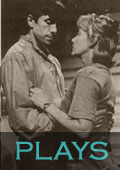|
Kitten Dubonnet, 38, leaves her St. Charles Avenue
home, her Brooks Brothers husband, her violent adoring
son. Compelled to leave town the day before his
departure for boarding school, she distracts herself by
going to a conference in the wilds of Missisippi. On the
way to Oxford, she hopes to confront the terrifying
reflections she has channeled in her journal, to open up
and claim the real someone she was meant to be. But a
stage four Hurricane Jose is approaching.
At Union Station, she sees her Tulane professor, Beau
Ellis, standing under a patchwork glass roof inside a
shaft of light, near an old commuter train.
She knows exactly what she is doing - going to graduate
school to get her PhD in poetry. Her generation is the
one that stopped the emotional beating that women had
endured since the Ice Age.
Giving Beau her bags, she ignores the scent from his
lapel that smells like her husband's Perry Ellis.
Despite his postion as teacher and mentor to women, Beau
believes that women shouldn't do too much to advance
themselves, insisting on careers and degrees. Secretly,
he prefers women to go unconscious and pretend that
their souls belong to him.
But the rain mounts into a tropical depression and the
train breaks down outside of Hammond. Kiotten and her
profesor must evacuate into a whistle-stop train station
perched in the Louisiana swamps.
The part of her who enjoys teas at the country club,
finger sandwiches on the Fourth of July, champagne
brunches on Mardi Gras say begins to demand retribution.
Has she been punished for her desire to evolve?
The rain pours, buiding into rushes. Soon, the porter,
Raven, a tough man with an Afro, arrives and tells them
that a hurricane is headed for the swamp. Kitten tries
to calm herself by writing in her journal and reading
Beau snatches of it. She and Beau talk a lot to mollify
themselves. Both yearn to heal their relationships as
they drink Sazeracs from a thermos and search for grace.
A bigger part of them loves poetry, wantes to be treated
with dignity, and feels that people deserve to grow.
When Raven chases a stowaway inside, Kitten panics on
seeing who it is. She goes unconscious, pretending that
the boy made a silly mistake. It is Kitten's 14-year old
son, Bunky, who has hiden on the train to spy on her.
Kitten tries to call her slick but aloof attorney
husband, but Raven says that the hurricane is 90 miles
away, and the engineer is turning Bunky in to the
Missisippi police. Kitten begs Ravenb to let her handle
the matter, but Raven handcuffs Bunky and leads him to
the train. Unsuccesfully, Beau pursues them in a valiant
effort to help.
Failing at that, Beau confronts Kitten about spoiling
Bunky and catering to a narcissistic husband. She
accuses him of degrading his wife and daughter with his
intellectual posturing.
Broken, Kitten shares with Beau her deepest fear that
her son will kill himself. She blames the psychiatrist,
her mother-in-law, her father-in-law, and her husband
for spoiling Bunky. Equally guilt ridden, Beau shares
with her his shame - he allowed his second wife to
brainwash his daughter against him, and he thought his
first wife was happy until he discovered she was an
alcoholic.
They are fighting the Big Easy in themselves and in
their city. New Orleans is a party town: beautiful
houses, people, lawns; music everywhere and romance in
an afternoon storm. But now romance has turned into
revenge. The ceiling buckles with a strangled sound.
Kitten and Beau hunt for her son through the shrieking
wind and flooding rain. They encounter misfits and
muggers in the swamp, abandoned trucks, boats, camps.
The boy and Raven make it back to the depot, both
contrite and changed by the avalanche of nature.
The eye of the storm hits, and everything turns green.
All four pray and forgive each other.
No one is sure he is alove, dead, or in a dream, seeing
about two hundred feet away a rescue boat,
phosphorescent, like mother-of-pearl. All are determined
to change their lives should they have a second
chance.
e
|











